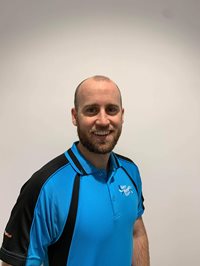Mental Health and Exercise
If you are experiencing a change in your mental health and require assistance today, please visit www.coronavirus.beyondblue.org.au or call 1800 512 348 today.
.jpg?width=500&height=333)
According to the World Health Organization, mental health is defined as “a state of well-being in which every individual realises his or her own potential, can cope with the normal stresses of life, can work productively and fruitfully, and is able to make a contribution to her or his community.”
In Australia, approximately 2 million people live with anxiety and around 1 million people live with depression. The great news is, regular physical activity has been found to help regulate your mental health (Beyond Blue, 2019).
Peoples mental health can change based on different factors and has a direct impact on our emotional, psychological, and physical well-being. Your mental health and wellbeing can also affect how you feel, think and act. Having a positive mental health can improve work productivity, improve your outlook on life and create stronger coping mechanisms to deal with everyday stress and anxiety.
The stats
According to Beyond Blue Australia, for those between the ages of 16 - 85 years old:
- One in seven Australians will experience depression in their lifetime
- One-quarter of Australians will experience an anxiety condition in their lifetime
- Females are more likely than males to experience anxiety or depression.
Exercise and mental health
According to various studies and industry mental health bodies, regular physical activity has been found to help regulate mental health and improve your mood (Beyond Blue, 2019).
In addition, regular exercise can also increase your energy levels, improve your sleep patterns, improve work productivity, improve your outlook on life, clear your mind after a tough day and create better coping mechanisms to deal with everyday stress and anxiety.
To help you get started, our Accredited Exercise Physiologist, Kyle Morcombe, has provided some fantastic exercise recommendations that may assist to help regulate mental health.
If you have not participated in physical activity/exercise in some time, then 5-10-minutes of low-moderate intensity aerobic exercise is all you need to get started! Then when you feel more confident, you can build on your time moving.
Don’t forget that it can take 6-8 weeks to create a healthy exercise routine and new routines. Starting small is okay - every bit of movement is beneficial to our mental health!
Example exercise guide - How often and what type of exercise can I do?
|
Frequency |
Intensity |
Time |
Type |
|
3-4 times per week |
Start with a Low -moderate intensity and build from there. The talk test is great way of identifying how hard you are working. You should be able to have a conversation with someone at low intensity. At moderate intensity you will be able to say a few words before needing to take another breath. |
30-40 minutes |
Any energetic exercise that causes you to breathe faster and deeper, and you start to sweat. Types of energetic exercise include walking quicky, jogging or running, riding a bike, playing sport or doing active housework and yard work. |
If you are looking for additional advice our accredited Exercise Physiologists can help and work with you from anywhere online via our Telehealth to find the right fit of exercise for you!
Click the button below to find out more or book in a session to receive expert exercise advice from our qualified Exercise Physiologists.
Additional support services for Mental Health:
- Lifeline – PH: 13 11 14 W: www.lifeline.org.au
- Beyond Blue - PH: 1300 224 636 W: www.beyondblue.org.au
- MensLine Australia - PH: 1300 789 978 W: https://mensline.org.au/
- Kids Helpline - PH: 1800 551 800 W: https://kidshelpline.com.au/
- Headspace - PH: 1800 650 890 W: https://headspace.org.au/
- ReachOut - W: https://au.reachout.com/
- Life in Mind - PH: 02 4924 6900 W: https://www.lifeinmindaustralia.com.au/
- SANE forums - PH: 1800 187 263 W: https://saneforums.org/
Article Author

This article was written by Accredited Exercise Physiologist, Kyle Morocombe.
Kyle is an Accredited Clinical Exercise Physiologist from Gurri Wanyarra Wellbeing Centre, Bendigo. He has a wide range of experience working with a variety of Neurological, Mental Health, Disability and Musculoskeletal disorders, Respiratory as well as experience working with high-performance athletes.
Kyle values himself being able to provide people with the appropriate knowledge and ability to regain their health and independence through exercise.
“What I love most about my job is seeing people take control of their health and seeing the satisfaction it brings when they see results and achieve their goals”.
Qualifications:
- Masters of Exercise Physiology
- Bachelor's of Exercise and Sports Science’
References
- Australian Bureau of Statistics. (2018). National Health Survey: First Results 2017-18. Canberra: ABS
- https://www.beyondblue.org.au/docs/default-source/default-document-library/beyond-blue-annual-highlights-2018-19-web.pdf
- Exercise is Medicine, Depression factsheet, 2014. Retrieved from: https://exerciseismedicine.org/.
- Anxiety and depression society of America, 2010-2018. Retrieved from: https://adaa.org/living-with-anxiety/managing-anxiety/exercise-stress-and-anxiety
- Exercise for Mood and Anxiety, Proven Strategies for Overcoming Depression and Enhancing Well-Being, by Michael W. Otto, PhD, and Jasper A.J. Smits, PhD (Oxford University Press, 2011)
- ABS National Survey of Mental Health and Wellbeing: Summary of Results, 2007 (2008), p 27 28 41
- Whiteford, H. A., Buckingham, W. J., Harris, M. G., Burgess, P. M., Pirkis, J. E., Barendregt, J. J., & Hall, W. D. (2014). Estimating treatment rates for mental disorders in Australia. Australian Health Review, 38, 80–85
- Mental Health and Exercise, 2020. Retrieved from: https://www.mentalhealth.gov/basics/what-is-mental-health
- Mental Health Benefits of Exercise, 2020. Retrieved from: https://www.helpguide.org/articles/healthy-living/the-mental-health-benefits-of-exercise..



